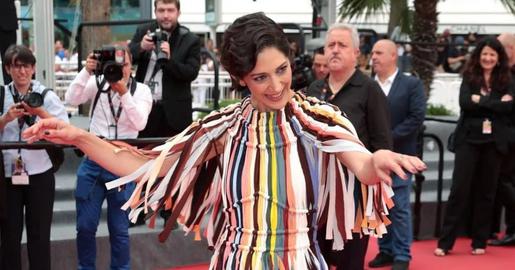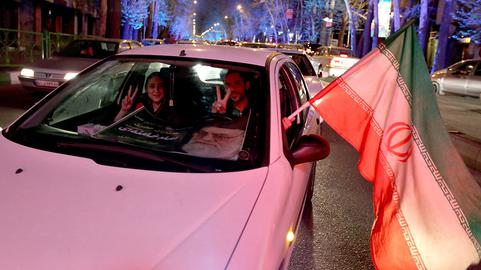The Islamic State is a catalyst for change in the Muslim world, especially in Iran, writes TV producer and Middle East commentator Arash Sahami.
Am I the only one who sees the parallels between Abu Bakr Al Baghdadi, leader of the so-called Islamic State (IS), and Martin Luther, the 16th-century protestant reformer?
True, unlike Mr. Baghdadi, Luther was not bloodthirsty and he certainly didn’t participate in beheadings, mass executions or modern day slavery. And yet, much like Luther’s protestant reformation, Islamic State is dogmatic, purist and absolutist. Equally, like IS, Luther sought to establish a society where everything would be remade in accordance with the principles and the law of God.
Luther was a staunch defender of medieval doctrine and happens to be the godfather of modern European Anti-Semitism. “First to set fire to their synagogues or schools, and bury and cover with dirt whatever will not burn, so that no man will ever again see a stone or cinder of them,” he wrote. “This is to be done in honor of our Lord and of Christendom, so that God might see that we are Christians.”
Luther was no angel and his "reformation" took the lives of tens of millions of Europeans but all the same he was a catalyst for wide political reform, greater literacy and the eventual separation of church and state.
So a question beckons: Could Abu Bakr Al Baghdadi also act a catalyst for social, political and religious reform in the Middle East?
The emergence of Islamic State, with billions of dollars at its disposal, has forced peoples and governments in the region to clarify where they stand. Both want to distance themselves from IS, and this is accelerating the pace towards wider cultural and religious reform.
Most Muslims seem to agree that Islamic State is the proverbial “something else”. Even the Taliban have declared war on Islamic State for being just a tad too evil and for falsely interpreting their religion.
The truth is that when a religious "interpretation" is fed to people with either very little understanding or education, it will always result in a fueling of the sectarian beast. Interestingly, in a classified briefing note put together by MI5’s Behavioral Science Unit in 2008, experts revealed that “far from being religious zealots, a large number of those involved do not practice their faith regularly. Many lack religious literacy and could be regarded as religious novices.”
For many years, radical political Islam, in its purest practice, was exemplified and influenced by opposing (theocratic) interpretations by Shia Iran and Sunni Saudi Arabia. Both have undergone reforms at their own pace and within the restrictive bounds of their respective religious constructs. However, any government-sanctioned reform has been the result of international outrage on singular topics, such as the execution of minors or women’s rights to vote or drive, and the subsequent need for each country to media-manage a rebuttal. In neither country has change been the product of open dialogue.
Iran, the nemesis of Sunni Islamic State, and a candle-bearer for the world’s Shia population, has been at the epicentre of a quasi-reform initiative for many years. Although the "Green Movement" officially ended with the arrest of its leaders, Mir-Hossein Mousavi and Mehdi Karoubi in 2011, cultural and social reform movements are actively seeking other ways to get their voices heard.
Iranian women are at the heart of a movement pushing for greater personal and religious freedoms. Together with the national student, labor and youth movements, they are known as "Third Iran", which ultimately seeks the separation of religion and state but has no appetite for a standoff with the authorities, much less to topple the regime.
As a young, educated and pragmatic group,"Third Iran" makes up a sizeable 70 percent of the population. It is peaceful, and promotes dialogue, understanding, equality and education, while "wiping Israel from the map" is not one of its goals, nor does it chant “death to the USA.” And now that the Iranian government is engaging internationally, especially in terms of its nuclear programme, ‘"Third Iran" has become emboldened. It understands that the momentum for change is now whilst the country opens up and a new era begins.
Federica Mogherini, chief nuclear negotiator for the EU, called the recent agreement a “disaster for Islamic State." And, indeed any cooperation between the West and the Muslim world is terrible news for an entity that is empowered by widening sectarian divides in the region. However it is great news for pro- reform, democracy and accountability movements.
Coincidently, the Iranian regime seems to be shifting its focus from a three-decade long battle with indigenous foes to an international battle against the ultimate villain — Islamic State — and this is providing a real opportunity for "Third Iran" to solidify as a platform for change. The regime knows full well that clerics wield enormous power in today’s Iran and this is a historical aberration, which needs reform and order to remain sustainable.
One day Islamic State will be defeated, but the false philosophies that attract thousands of adherents to its cause or similar causes will live on and will one day return to haunt us again unless we clarify to ourselves what it is we will not stand for — a universal human code of conduct. This should be true regardless of which religious banner we stand under or the situation Islamic State have brought upon us. This will force regional governments to make clearer choices and pave the way for real social and political change, including religious freedoms.
To read more stories like this, sign up to our weekly email.




















comments